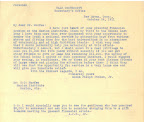As someone who taught at a venerable old military school in Virginia which closed its doors, I can tell you that it was not a pretty sight. Augusta Military Academy (1865-1984) had an illustrious history, distinguished alumni, and an enviable record of service to Virginia and the nation. In the end, the Corps was down to about 80 cadets (beds for 600) and the cadets returned from Christmas furlough only to find that their school had closed.
The leadership of MMI has constantly struggled to keep the doors open and to provide a quality educational program.
An example of this struggle is highlighted in the following letters from the Hopson Owen Murfee Papers housed in the MMI Archives. Murfee, son of our founder, served as the second president of MMI. It was he who wanted to transform the Institute into his “Eton of the South” concept modeling the school after one of the great English public schools. This dream lasted until the outbreak of World War I when the military program was again emphasized at MMI and the ROTC programs were established.
These letters from 1911 – two from Anson Phelps Stokes, Jr., Secretary of Yale University (second only to Yale’s president) and H. O. Murfee’s eventual reply - show that MMI needed $12,000 immediately to keep its doors open – a hefty sum in 1911. That H. O. Murfee felt the need to contact Stokes regarding this crisis (Stokes had visited MMI the year before) underscores the seriousness of the problem. It also illustrates the fine list of associates which Murfee had amassed over the years to support MMI and its programs. Murfee found that going First Class, to borrow the English phrase, costs money and lots of it, and he was compelled to call upon his friends to support the Institute.


The crisis of 1911 was averted, but it was just one instance in a long string of challenges faced by the MMI leadership. H. O. Murfee’s heartfelt letter to The Rev. Stokes at Yale typifies the strong Christian faith and moral values of MMI and its leadership.
